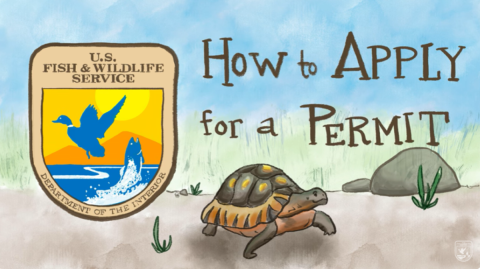What We Do
Our Projects and Initiatives
The conservation permitting program within the U.S. Fish and Wildlife Service’s International Affairs program reviews permit applications and issues an average 20,000 permits per year, facilitating more than $675 million in wildlife trade annually. In addition, our permitting staff respond to over 70,000 inquiries from the public and applicants, and more than 60 Freedom of Information Act (FOIA) requests annually.
The permits we issue facilitate a legal, traceable, and biologically sustainable trade in wild plants and animals. We implement permitting requirements administered by the Service for the Endangered Species Act (ESA), Convention on International Trade in Endangered Species of Wild Fauna and Flora (CITES), Wild Bird Conservation Act (WBCA), and injurious wildlife provisions of the Lacey Act.
Our work supports the Service’s overall permitting program. We also coordinate closely with other Service programs and regional offices concerning the international movement of species protected under the Bald and Golden Eagle Protection Act, Migratory Bird Treaty Act, and Marine Mammal Protection Act. In addition, we coordinate on these and other conservation laws as appropriate with other federal agencies, and state, Tribal, and foreign governments.
What is a Permit? |
Frequently Asked Questions About International Affairs' Permits
Apply for a Permit
Our video, "How to Apply for a Permit" explains what criteria you will need and how to apply online for a permit. (Please note, not all permits are fully digitized yet.)
Our Conservation Permitting Team
Our International Affairs permitting team currently consists of 38 individuals, including full time and part time staff in the Division of Management Authority and the Division of Scientific Authority. Our permitting program includes biologists, managers, and an administrative team who work on permit applications and decisions, Federal Register Notices, Freedom of Information Act (FOIA) requests, legal searches, and provide educational outreach.
Our Permit Applicants
We receive permit applications from a range of applicants, such as commercial exporters and importers of plants and animals (live/products), biomedical companies; plant nurseries; hunters; researchers, zoos, and conservation breeding programs; individual exotic pet owners and hobbyists; and museums or other cultural institutions.
Navigating the Permit Application Process
For each permit application we receive, we review relevant domestic and foreign laws to ensure legality and consider the risks and benefits of the proposed activities for the wildlife species. Where applicable, we also ensure the activity will not be detrimental to the survival of the species in the wild. In making our determinations, we use the best available information and expertise to ensure that the trade in wildlife and wildlife products is legal, traceable, and when applicable, biologically sustainable. Our science-based review ensures the requested activity is allowable under our laws and regulations.
Improving our Services
To improve our overall permitting process and alleviate burdens to our permit applicants, we made the following changes:
- Using funding appropriated by Congress, we hired additional staff who are dedicated to processing the permit applications received in our office.
- We digitized the top five applications, which are all for the export of wildlife listed in CITES, reducing the vast amount of work needed to submit paper applications.
- We created “Master Files” that can streamline certain activities. Master Files may be valid between one to three years and allow for multiple exports or re-exports of pre-authorized specimens to various destinations over an authorized period of time.
- To assist pet owners traveling with their exotic pets and musicians whose instruments are made with protected species, we created multi-use passports. These passports are typically valid for three years and are intended for multiple border crossings. Creating these passports has greatly reduced the burden of private citizens applying for single-use permits.
- To continue to improve our services, we contracted with a third party to conduct a comprehensive needs analysis on our conservation permitting program. "Project Jaguar," as it was called, analyzed our permitting process with the aim of identifying opportunities to innovate and optimize our process to better serve our permit applicants and maximize conservation outcomes. This report, produced by The Jandor Group for the U.S. Fish and Wildlife Service, outlines their approach, review, recommendations, and suggested next steps.
Return to International Affairs' Homepage


